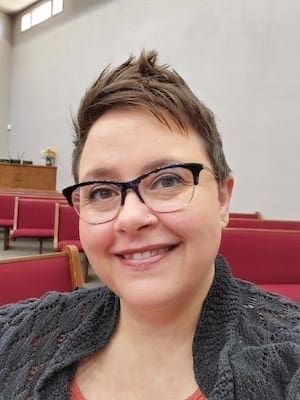I am in the process of becoming a victim advocate as part of the Pima County Attorney’s Victim Services Division in Tucson, Arizona.
Victim advocate volunteers provide crisis support, court support or both in Pima County to victims, most often of violent crimes.
I wanted to do this work for a couple of reasons.
First, I have a heart for people in need.
As a survivor of domestic abuse and as a woman whose husband died by suicide, I understand what it means to be in the middle of traumatic events.
I understand the aftermath of trauma and how important it is to have someone in your corner immediately helping with the pragmatic things that need to be done.
Second, I am a pastor in my first calling.
It was a calling that I did not expect to take up as soon as I did, but here I am. I am also a pastor in my first ministry job ever.
My most recent career experience was in higher education, but prior to that I was firmly rooted in the corporate world. As a result, the world of ministry is a bit foreign to me.
For better or worse, things work differently in a church and, in part, I believe that working as a victim advocate will help me be a better pastor.
At the initial information session, the volunteer coordinators explained that if we make it through the interview and background checks, we will be required to undergo an intensive 35-hour crisis intervention training program.
During this training, we will learn about various topics, such as crisis theory, cultural awareness, domestic violence and sexual assault.
After this initial session, I began thinking about how, as a pastor in the Baptist tradition, training like this is not always required.
If you are studying toward your master of divinity degree, some schools require a unit of clinical pastoral education, but some do not. This is assuming that you are pursuing a master of divinity degree, which many, if not most, churches do not require.
Long story short, we have many pastors who lack the training and skills needed to counsel and advocate for victims.
I suspect that the lack of this type of training is why we have too many recent reports of pastors telling wives they must stay with their abusive husbands.
Or reports of pastors being allowed to stay in positions of leadership when they have admitted to abusing or assaulting someone.
Or sermons where pastors shame women for not dressing modestly when they should be instructing men not to objectify women and treat them only as sex objects.
These behaviors are born out of an unbiblical patriarchy and a selfish desire to keep the church out of the news rather than concern for the victim.
All throughout Scripture, we are commanded to care for those that cannot care for themselves.
Many of these passages specifically mention widows, orphans and aliens, and too often we restrict our advocacy to these categories.
To truly call ourselves advocates, we must view these categories more broadly and recognize that the people mentioned in these passages are victims of their situations.
We should acknowledge that all victims deserve someone who will always advocate for them on their behalf, especially when they are unable to do so.
Every time we do not advocate for the victim in these tragic situations, we are telling the world who we are and what we value.
And we still wonder why church attendance is declining at such a rapid pace.
Although it is not the only reason, I submit that the church’s very visible hypocrisy concerning victims drives much of this decline.
A growing number of Americans, roughly 23% of the U.S. adult population, self-identify as either atheists, agnostics or without religious affiliation.
A recent Pew Research study indicated that 49% of these “nones” indicated that they opposed the church’s position on social and political issues. Enveloped in this category are how we behave toward victims.
Pastors, the world is watching how we treat victims. And they do not like what they see. We must do better.
Editor’s note: This article is part of a series focused on engaging emerging faith leaders. Learn more about EthicsDaily.com’s “Emerging Voices” and “U:21” series here.


